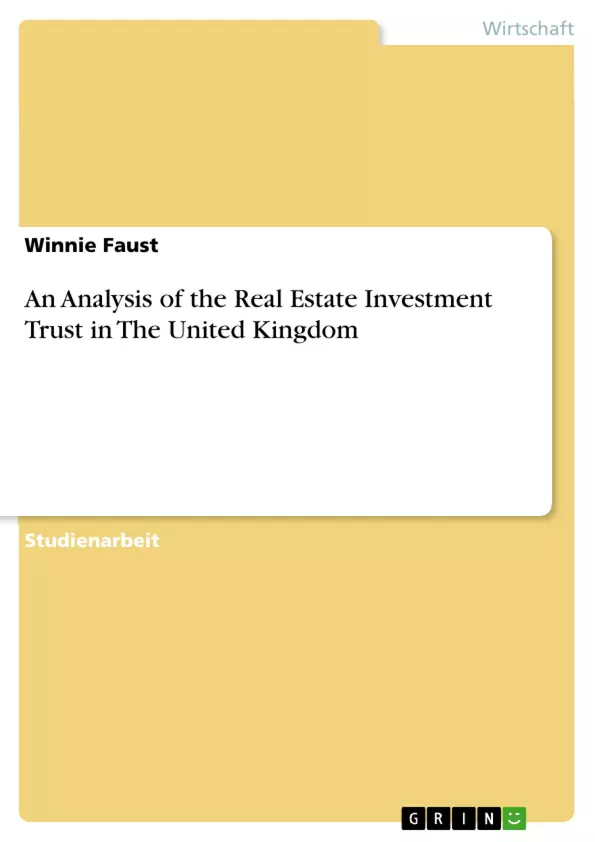The aim of this paper is to analyse the Real Estate Investment Trust system in the United Kingdom. In order to do so the first topic is the background information followed by an analysis of the current situation. Furthermore there will be a comparision between the advantages and disadvantages of the REIT.
The REIT system, in combination with London's strong and traditional capital markets, has given the property investment sector the opportunity to grow. The law to set and preserve the identity of REITs in the United Kingdom was enacted in January 2007 and soon after that several property groups changed to REITs as well as some start-up REITs developed. Basically Real Estate Investment Trusts allow property companies to take part in the equity markets and thus provide financial means to end-investors without any tax leakage. Therefore UK-REITs offer further asset classes to investors and shareholders. REIT, which stands for Real Estate Investment Trust, deals with real estate as its asset. Therefore someone could assume that REIT was to be an equivalent alternative to direct property investment. Instead trade as equities follows other market mechanism than the cumbrous direct property market does. Trading on equities may change the character of REITs as investments, which comes apparent in the volatilities of direct real estates and REITs. The question arises whether REITs is to be seen as an investment in real estate or in equities or if it represents a hybrid form of both characteristics. Are REITs belonging to the real estate allocation or are they part of the equity allocation? A recent study reveals that 35% of US investors acknowledge REITs as an element of real estate business, while 37,5% favour them to be part of the equity section. Because the answer to this relevant question is very vague and undecided, it could explain why institutions still only take gentle steps towards the REIT market.
Inhaltsverzeichnis
- Introduction
- What Is Reit?
- Background Information
- The Pre Uk Reit Dialog
- Current Situation
- Taxes
- Advantages And Disadvantages Of Reit
- Future Developments
- Real Life Examples And Case Studies
Zielsetzung und Themenschwerpunkte
Dieser Text befasst sich mit Real Estate Investment Trusts (REITs) im Vereinigten Königreich und untersucht ihre Entwicklung, Regulierung und Bedeutung für den Immobilienmarkt.
- Definition und Funktionsweise von REITs
- Die Entstehung und Entwicklung von REITs im Vereinigten Königreich
- Die rechtliche und steuerliche Rahmenbedingungen für REITs
- Die Vorteile und Nachteile von REITs für Anleger und Unternehmen
- Aktuelle Trends und zukünftige Entwicklungen im REIT-Sektor
Zusammenfassung der Kapitel
- Introduction: Die Einleitung stellt die Bedeutung von REITs für den britischen Immobilienmarkt dar und liefert einen kurzen Überblick über die Entstehung und Regulierung von REITs im Vereinigten Königreich.
- What Is Reit?: Dieses Kapitel definiert REITs und erläutert ihre Funktionsweise. Es wird untersucht, ob REITs eher als Immobilien- oder Aktieninvestition betrachtet werden sollten.
- Background Information: Dieser Abschnitt beleuchtet die historische Entwicklung von REITs und die Herausforderungen, die mit dem Aufbau eines REIT-Marktes in Großbritannien verbunden waren.
- The Pre Uk Reit Dialog: Dieser Abschnitt befasst sich mit den Diskussionen und Debatten, die vor der Einführung von REITs im Vereinigten Königreich stattfanden, und den Faktoren, die zu ihrer Einführung führten.
- Current Situation: Dieses Kapitel analysiert die aktuelle Situation des REIT-Marktes im Vereinigten Königreich, einschließlich der wichtigsten Akteure, der Marktstruktur und der aktuellen Trends.
- Taxes: Dieser Abschnitt befasst sich mit den steuerlichen Rahmenbedingungen für REITs im Vereinigten Königreich, sowohl für die REITs selbst als auch für die Anleger.
- Advantages And Disadvantages Of Reit: Dieses Kapitel präsentiert die Vor- und Nachteile von REITs für Anleger und Unternehmen, beleuchtet die Vorteile für die Diversifizierung des Portfolios und die Steigerung der Kapitalrenditen, aber auch die Risiken und Herausforderungen, die mit REIT-Investitionen verbunden sind.
Schlüsselwörter
Real Estate Investment Trusts (REITs), Immobilieninvestitionen, Aktienmarkt, Finanzmarkt, Regulierung, Steuern, UK REITs, Kapitalrenditen, Diversifizierung, Immobilienmarkt, UK-REIT-Sektor.
Häufig gestellte Fragen
Was ist ein REIT (Real Estate Investment Trust)?
Ein REIT ist ein Unternehmen, das Immobilien besitzt und verwaltet und Anlegern ermöglicht, über die Börse in Immobilien zu investieren, ohne direkt Eigentum zu erwerben.
Seit wann gibt es REITs im Vereinigten Königreich?
Das Gesetz zur Einführung von REITs im UK trat im Januar 2007 in Kraft.
Gelten REITs als Immobilien oder als Aktien?
Das ist umstritten; sie werden oft als Hybridform betrachtet, da sie zwar Immobilien als Basiswert haben, aber wie Aktien an der Börse gehandelt werden und deren Volatilität unterliegen.
Welche steuerlichen Vorteile bieten UK-REITs?
Sie ermöglichen es Immobiliengesellschaften, am Aktienmarkt teilzunehmen und Gewinne an Endinvestoren auszuschütten, ohne dass auf Unternehmensebene eine Steuerbelastung ("tax leakage") entsteht.
Was sind die Nachteile einer REIT-Investition?
Nachteile sind die Abhängigkeit von den Mechanismen des Aktienmarktes, die höhere Volatilität im Vergleich zu direkten Immobilieninvestments und regulatorische Auflagen.
- Quote paper
- Diplom Winnie Faust (Author), 2015, An Analysis of the Real Estate Investment Trust in The United Kingdom, Munich, GRIN Verlag, https://www.grin.com/document/370417



